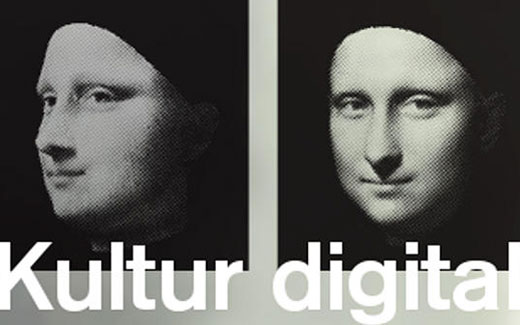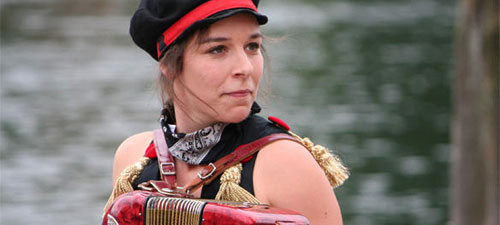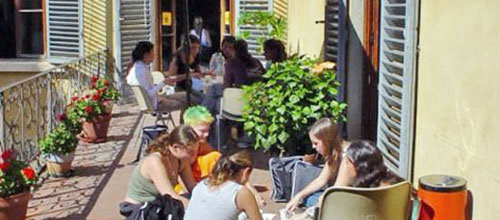
Migros Culture Percentage
For 54 years, the commitment of Migros Culture Percentage in the areas of culture, society, education, leisure and business has had a long-term and sustainable orientation. What is more, Migros Culture Percentage always has its finger on the pulse of the times and observes and describes all developments. One example is the digital change.
Culture on the pulse of the times
The digital change has also had a deep impact on culture. In its widely debated «Kultur digital» (2011) publication, Migros Culture Percentage examined the change's underlying influences on culture and society. While its home, the Löwenbräu premises in Zurich, is being converted, the migros museum für gegenwartskunst will be at a temporary location until June 2012. It is taking this as an opportunity to send on tour the approx. 1400 pieces of art collected since its inception. This has allowed various European institutions to present the exhibits in new contexts. Between May and October 2011, the migros museum für gegenwartskunst pitched its tent on the farm of Martin Blum in Samstagern (ZH) with The Garden of Forking Paths sculpture project. Art in an unusual environment enticed a large and varied group of visitors out into the countryside.

Since 1969, Migros Culture Percentage has supported the promotion of young Swiss artists with student awards. To gain a foothold in the profession, however, young artists also need contacts, gigs and the possibility to present their work. The online talent platform of Migros Culture Percentage, which was launched in autumn 2011, meets all these needs. Cultural event organisers and agencies can easily discover new talents there.
In the limelight of society
Voluntary work is an important part of Swiss culture; some 700 million man-hours are worked annually in the country. As part of the European year of volunteering, Migros Culture Percentage's Herz sei Dank! campaign highlighted the work performed by the many quiet helpers in the background: people who work outside an organisation or association without pay for their fellow citizens. The campaign to publicly say thank you to these often invisible pillars of society was initiated by calls from the public and saw a huge response. Numerous celebrities supported the campaign from the very beginning.
Grandmothers also make an important contribution to social cohesion. With the GrossmütterRevolution, Migros Culture Percentage supports networks of grandmothers and provides a platform and think tank for their commitment. 200 grandmothers announced a grandmothers' manifesto in Zurich in June 2011, in which they highlighted their services to society and made political demands.
On 1 November 2011 the ground-breaking ceremony for the Orange Garden with a museum pavilion, a public event garden in the direct neighbourhood of Migros Rüschlikon Parkside and Park im Grüene, was held. The aim of the project is to make the history of Migros tangible with all senses. In the garden, which will be dominated by orange blossom, fruit or leaves throughout the year, Migros presents itself in individual «theme islands». One of them is the Migros pavilion. Here, visitors are given the opportunity to research Migros' past and present in an interactive way. The opening of the orange garden landscape will take place in summer 2012, on the occasion of the 50th commemorative year of Gottlieb Duttweiler and the UN's International Year of Cooperatives.
Innovative education
450 000 people interested in education – that is the staggering number of people who visited one of the 600 courses and seminars at the 50 locations of the Migros Club School in 2011. And never before have so many of them enrolled directly online. The Business Club School area was dominated by many innovations: new courses, such as Personal Trainer, were rolled out successfully, and the cooperation with Google in online marketing expanded. The investment courses developed jointly with Migros Bank were hugely popular with the audience and will be extended in 2012. Some cooperatives also went innovative ways in consulting and sales: by centralising the customer services centre, the further education courses of the Migros Club School can now be offered across locations.
The markets in which the Eurocentres are active are developing very differently, depending on the region in the world. Emerging markets are growing, traditional markets are stalling or shrinking, protectionist tendencies in politics are resulting in stricter visa requirements for students. But the performance of the Eurocentres in 2011 was on a par with the previous year. The building of the first Eurocentre language school established in Bournemouth in 1948 was comprehensively refurbished to turn it into a contemporary learning environment in 2011. The gradual rolling out of interactive whiteboards was also started in England and France. These tools bring up-to-date equipment and new media into the classroom.
Outdoor leisure
The four Parks im Grünen offer local recreation and an experience of nature with free admission for the young and old – in Münchenstein (BS), Rüschlikon (ZH), Bougy-Villars (VD) and on the Gurten (BE). In addition to the permanent attractions and traditional 1 August celebrations, changing events, including the legendary Thé dansants in which people meet for coffee, cake and dance music, the popular kids’ open-air cinema or the new Lilibiggs games corner, were organised in 2011.
Monte Generoso, the mountain with the most attractive view in Ticino, was dominated by a temporary installation. At the end of the 2010 season, the hotel and self-service areas on the peak sustained minor damage following an earthquake. The parts affected were immediately closed for safety reasons. This lasted throughout the entire 2011 season. The self-service area and the sun terrace were provisionally relocated to the undamaged part of the building, where the serviced restaurant can also be found. A geological and a statics report showed that the operations can be continued without any concern; and at Easter 2011, everything was reopened to the joy of the public. The strong euro, the bad summer weather and the reduced offer meant that Ferrovia Monte Generoso was unable to perform at its level of previous years. Various scenarios were explored for the closed wing of the building in 2011, and these will be implemented in 2012.
Strong interest for questions regarding the economy
The Gottlieb Duttweiler Institute (GDI) was repeatedly in the public eye in 2011. The bestowing of the Gottlieb Duttweiler Award on Wikipedia founder Jimmy Wales reverberated far beyond the borders of the country. The new book by David Bosshart, «The Age of Less. Die neue Wohlstandformel der westlichen Welt», which put it amongst the top ten of various bestseller lists, was also widely discussed. The GDI youth study, «Die Superopportunisten», on the mindset of the twenty-somethings was also successful, while the top-class debate held at the GDI between the philosopher Richard David Precht and the economist Ernst Fehr was broadcast on the Sternstunde Philosophie TV show (SRF). The traditional International Retail Conference and the European Consumer Trend Conference once again proved to be important industry get-togethers.
At the Gottlieb Duttweiler Chair of International Retail Management at the University of St Gallen, doctoral theses on cross-channel management, customer loyalty, saving patterns and expansion management were presented. The St Gallen Internet Day informed decision- makers of the latest trends in online retail trade and presented a new edition of the Purchasing Behaviour on the Internet study. Sector-specific studies researched consumption trends in Swiss food, sport, electronics, clothing and furniture retail trade; new publications examined cross-channel management, the perception of discounters and Christmas retail trade.